PPO is an engineering thermoplastic known for its excellent radiation resistance, oxidation resistance, thermal stability and electrical properties. Typical applications include television cabinets, car spoilers and laptop computer outer shells. PPO has one of the lowest water absorption rates of any of the engineering thermoplastics and has excellent flame retardance, electrical properties and impact strength.
One of the best-known trade names for this material is Noryl (GE Plastics) and this is not only widely used in the automotive industry, but also in the building and construction sector and for switchgear, etc.
PPO is relatively easy to bond but can be stress cracked by uncured cyanoacrylates, UV acrylics and solvent-based activators and primers.
Best results were achieved in these trials [2] with a standard cyanoacrylate and the use of primer only produced a marginal increase in strength (Table 2.13). All the other adhesives tested gave medium to lower strengths (including the toughened cyanoacrylate).
 1 октября, 2015
1 октября, 2015  Pokraskin
Pokraskin  Опубликовано в рубрике
Опубликовано в рубрике 